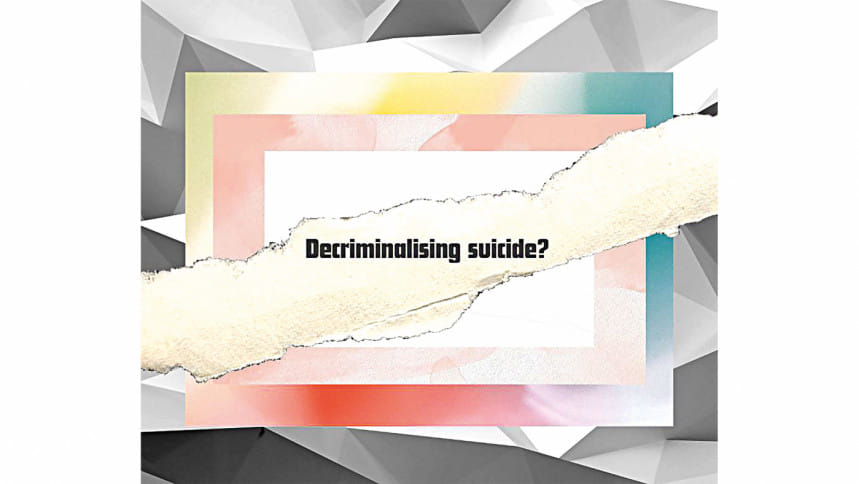Decriminalising the attempt to commit suicide

In Bangladesh, a comprehensive study by the Centre for Injury Prevention and Research, Bangladesh (CIPRB) in 2013 found that more than 10,000 people die every year owing to suicide. It is important to note that attempting to commit suicide is a punishable offence under section 309 of the Penal Code, 1860.
Although we inherited this law from our colonial Master, the British decriminalised the attempt to commit suicide through the Suicide Act, 1961. In fact, today, only around twenty-three countries still have such "anachronism unworthy of a humane society" as was observed by Rajinder Sachar, J in the case of State v Sanjay Kumar Bhatia (1985).
Whether section 309 of the Penal Code should be deemed to be unconstitutional or not is a matter where we do not have much jurisprudence. However, in India, there has been ample discussion on the constitutionality of section 309 of the Indian Penal Code (IPC). The first landmark judgment to discuss in this regard is P. Rathinam v Union of India (1994) where the issue before the Divisional Bench of the Supreme Court was whether the said section is unconstitutional or not. The divisional bench held that section 309 contravenes Article 21 of the constitution of India, which is similar to Article 32 of Bangladesh's constitution. The Court noted that "a person cannot be forced to enjoy right to life to his detriment, disadvantage or disliking". According to the Court the right to life includes "the right not to live a forced life."
Criminalisation of attempted suicide is unfair, ineffective, and counterintuitive. All it really does is it shifts our focus from the real social, economic, or psychological reasons behind suicide and blame a person who is perhaps already going through tremendous mental agony and pain. If we want to really solve this problem, we need to start by decriminalising attempted suicide.
This dictum was, however, reversed in the case of Gian Kaur v State of Punjab (1996). The principal question before the full bench of the Apex court was if section 309 is unconstitutional, how can the abetment of the same be punishable under section 306 of the IPC (which is similar to section 306 of our penal code)? The Court reversed the decision of the Rathinam case and held that both sections 306 and 309 are constitutional. The court stated, "the 'right to life' is a natural right embodied in Article 21, but suicide is an unnatural termination or extinction of life and, therefore, incompatible and inconsistent with the concept of right to life."
However, the author would like to humbly disagree with the judgment of the Gian Kaur case and submit that the dictum of the Rathinam case is more correct. Firstly, the Rathinam case in para 102 of its judgment had already dealt with the apprehension about whether section 306 of the IPC could survive without section 309 or not. The court correctly observed that these two offences are on different footings, and one does not depend for its survival upon the other. This is clearer now as India, in its new penal law- 'The Bharatiya Nyaya Sanhita', has omitted the provision of 'attempt to commit suicide' but kept the provision relating to abetment of suicide and therefore proved that one can survive without the other. Secondly, the Supreme Court in its latest landmark judgment Aruna Ramchandra Shanbaug v Union of India (2011) stated in its obiter, "Although section 309 has been held to be constitutionally valid in Gian Kaur's case the time has come when it should be deleted by Parliament as it has become anachronistic." In pursuance of the recommendation, India, at first, partially decriminalised attempted suicide by enacting section 115 of the Mental Healthcare Act, 2017 and later, fully with their new penal law.
Coming to the question of the most effective way of dealing with the problem of suicide, the World Health Organisation (WHO) in its report "Preventing Suicide: A Global Imperative" in 2014 mentions that countries need to take steps to destigmatise mental-health related issues, raise awareness, build a robust mental health system and related facilities, etc to properly tackle this problem. However, criminalisation of attempts to commit suicide further perpetuates the stigma and blames the person wanting to commit suicide rather than focusing on solving the problems that are causing people to take such drastic actions. Furthermore, it is sometimes argued by people who support the criminalisation of attempted suicide that if attempted suicide is decriminalised then other acts like 'suicide bombing' or 'blackmailing with the threat of committing suicide' will also cease to be offences. However, such an argument is ill-founded as such actions are clearly penalised under section 13 of the Arms Act 1878, section 383 of the Penal Code, etc.
The argument that criminalisation of attempted suicide has deterrent effect is also superficial in that people who have made their minds to commit suicide would perhaps do it anyway regardless of the punishment. Rather, the law punishes them if and when their attempt falls short. Hence, this law, instead of being sympathetic towards the people who have survived, stigmatises them further and creates an even more onerous situation for them. In our context, the enacting of the Mental Health Act 2018 is seemingly a step in the right direction.
Criminalisation of attempted suicide is unfair, ineffective, and counterintuitive. All it really does is it shifts our focus from the real social, economic, or psychological reasons behind suicide and blame a person who is perhaps already going through tremendous mental agony and pain. If we want to really solve this problem, we need to start by decriminalising attempted suicide.
The writer is Law Desk Assistant, The Daily Star.

 For all latest news, follow The Daily Star's Google News channel.
For all latest news, follow The Daily Star's Google News channel. 



Comments